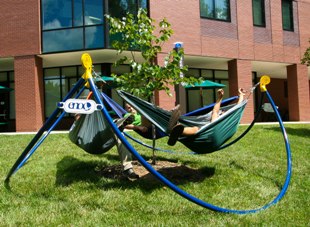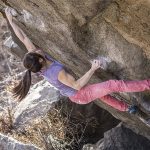Eagles Nest Outfitters Inc. (ENO) began shipping a line of hammock stands last week as part of a broader response to an incipient backlash against the proliferation of hammocks on college campuses.
College students have helped turn ENO one of the hottest brands in the outdoor industry, but concerns over safety and damage to trees has prompted a few schools to ban “hammocking’ on campus, according to an article that appeared on the front page of The Wall Street Journal on Sept. 24.
The largest of three new stands ENO began shipping this week is a redesigned version of the ENOpod, which was originally developed to hold three hammocks and up to 1,200 pounds for use at festivals. ENO had been marketing the festival version of the ENOpod to universities, but was limited to focusing primarily on schools near its headquarters in Asheville, NC because the stand’s size and weight made it prohibitively expensive to ship.
 The new model, which is shown here, consists of 12 pieces that can be easily shipped, assembled without tools and fit in most car trunks. Another model holds one hammock and a third can be used with a car at campsites or other locations where trees or posts are not available.
The new model, which is shown here, consists of 12 pieces that can be easily shipped, assembled without tools and fit in most car trunks. Another model holds one hammock and a third can be used with a car at campsites or other locations where trees or posts are not available.
“We’re excited about our new stands as they are both lighter, and way more portable than their predecessors,” ENO’s Marketing Coordinator Natalie DeRatt told The B.O.S.S. Report via email. “As they now break down to smaller pieces, we can ship them with regular UPS and so have opened up so many doors to universities who are experiencing some back lash from their administration on campus hammocking. We now have an immediate solution to keep hammocking alive!”
ENO has also developed a “Hammock Lounges” guide for schools that either lack trees or wish to direct hammocking away from delicate landscaping. In addition to the ENOpod, the guide shows how to build hammock lounges where users can hitch their hammocks to stationary sunken posts or movable tripods.
Finally, ENO is working with Leave No Trace to conduct a study on the effects of hammocking on trees.
“We 100% want to encourage and ensure responsible hammocking,” said DeRatt.















